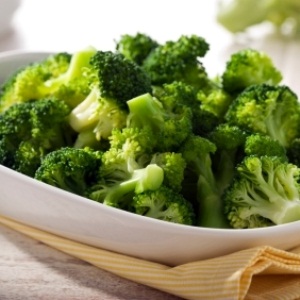
iStock
The way you prepare broccoli and related vegetables can alter their potentially cancer-fighting powers, new research shows.
Broccoli and other cruciferous vegetables are a good source of sulforaphane, a phytochemical (naturally occurring plant compound) that has shown strong anti-cancer properties in lab studies.
Steaming is best
However, the enzyme myrosinase in broccoli is needed for sulforaphane to form. If the myrosinase is destroyed, sulforaphane cannot form.
Researchers compared boiled, micro-waved and steamed broccoli, and found that steaming broccoli for up to five minutes was the best way to retain its myrosinase. Boiling and microwaving broccoli for one minute or less destroyed the majority of the enzyme, according to Elizabeth Jeffery, a researcher at University of Illinois at Urbana-Champaign.
Jeffery also found that if you do eat well-cooked broccoli, you can still get sulforaphane to form by adding raw foods containing myrosinase to your meal. Study participants ate a broccoli supplement with no active myrosinase. When some of them ate a second food with myrosinase, their blood and urine levels of sulforaphane were significantly higher than those who did not eat the second food with myrosinase.
The findings were presented at the annual meeting of the American Institute for Cancer Research in Bethesda, Maryland. Findings presented at medical meetings should be viewed as preliminary until published in a peer-reviewed journal.
"Mustard, radish, arugula, wasabi and other uncooked cruciferous vegetables such as coleslaw all contain myrosinase, and we've seen this can restore the formation of sulforaphane," Jeffery said in an institute news release.
Previous research has found that:
• Crushing or chopping garlic, and then waiting 10 to 15 minutes before exposing it to heat allows its inactive compounds to convert into the active, protective phytochemical known as allicin.
• Cooking tomatoes and other foods that contain lycopene allows our body to more easily absorb the beneficial phytochemical.
• Boiling vegetables for a long time means you lose water-soluble vitamins, such as vitamin C, foliate and niacin that leach into the water.
"As we're learning, food processing isn't just what happens to food before it reaches the grocery shelves," AICR associate director of nutrition programmes Alice Bender said in the news release. "This research highlights that what you do in your kitchen can make those fruits and vegetables on your plate even more cancer-protective."
More information
The American Cancer Society explains lifestyle choices that can reduce cancer risk.
Broccoli and other cruciferous vegetables are a good source of sulforaphane, a phytochemical (naturally occurring plant compound) that has shown strong anti-cancer properties in lab studies.
Steaming is best
However, the enzyme myrosinase in broccoli is needed for sulforaphane to form. If the myrosinase is destroyed, sulforaphane cannot form.
Researchers compared boiled, micro-waved and steamed broccoli, and found that steaming broccoli for up to five minutes was the best way to retain its myrosinase. Boiling and microwaving broccoli for one minute or less destroyed the majority of the enzyme, according to Elizabeth Jeffery, a researcher at University of Illinois at Urbana-Champaign.
Jeffery also found that if you do eat well-cooked broccoli, you can still get sulforaphane to form by adding raw foods containing myrosinase to your meal. Study participants ate a broccoli supplement with no active myrosinase. When some of them ate a second food with myrosinase, their blood and urine levels of sulforaphane were significantly higher than those who did not eat the second food with myrosinase.
The findings were presented at the annual meeting of the American Institute for Cancer Research in Bethesda, Maryland. Findings presented at medical meetings should be viewed as preliminary until published in a peer-reviewed journal.
"Mustard, radish, arugula, wasabi and other uncooked cruciferous vegetables such as coleslaw all contain myrosinase, and we've seen this can restore the formation of sulforaphane," Jeffery said in an institute news release.
Previous research has found that:
• Crushing or chopping garlic, and then waiting 10 to 15 minutes before exposing it to heat allows its inactive compounds to convert into the active, protective phytochemical known as allicin.
• Cooking tomatoes and other foods that contain lycopene allows our body to more easily absorb the beneficial phytochemical.
• Boiling vegetables for a long time means you lose water-soluble vitamins, such as vitamin C, foliate and niacin that leach into the water.
"As we're learning, food processing isn't just what happens to food before it reaches the grocery shelves," AICR associate director of nutrition programmes Alice Bender said in the news release. "This research highlights that what you do in your kitchen can make those fruits and vegetables on your plate even more cancer-protective."
More information
The American Cancer Society explains lifestyle choices that can reduce cancer risk.




 Publications
Publications
 Partners
Partners











